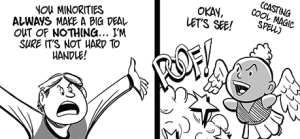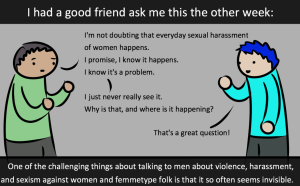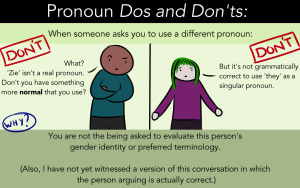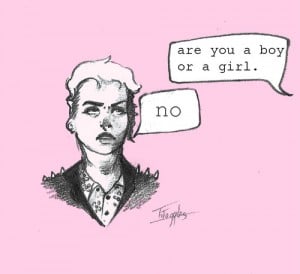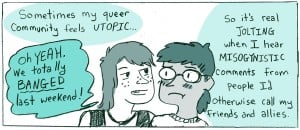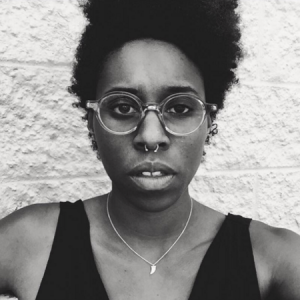
Closeup of a person with a somber expression, wearing dark-rimmed glasses, leaning against a window.
(Content Note: sexual violence, mention of eating disorder, ableist slurs with mental health stigma)
After going through nine therapists and psychiatrists from ages 12-23, I haven’t been to one in three years, even though I know it would probably be helpful. Part of this is my issue: I’m a workaholic, and I don’t prioritize my health, physical or mental.
But there’s another reason I’m hesitant to see a therapist again: I’m scared they’ll say something to make my problems worse. Because I’ve never actually had a therapist who didn’t.
I know I’m lucky to even be able to afford a therapist or access one in the first place. And in the process of dealing with anxiety, depression, and an eating disorder, seeing therapists has had a net gain for me. But that doesn’t mean there have been no losses in the process.
Particularly, many of the therapists I saw operated under many assumptions about gender that weren’t true to my experience and actively harmed my mental health.
Here are a few ways therapists failed me as a woman – and what they and many therapists could do differently.
1. Encouraging Gender Essentialism
Several therapists have made it their mission to make me proud to be a woman. When I spoke about my dislike of my assigned female body and people’s tendency to view me as feminine because of it, they took this as a sign of low self-confidence and poor body image.
It was actually a sign that I didn’t identify with my assigned gender role. Although I still partially identify as a woman, I consider myself non-binary and definitely don’t identify as a feminine person.
In an effort to increase my self-esteem, therapists forced womanhood down my throat. One spoke about the solidarity all women supposedly feel and how amazing it is that we can give birth, even though I didn’t want kids.
Another told me to take some time in the shower to appreciate “how amazing a woman’s body is.”
During this time, I was suffering from an eating disorder related to not wanting to appear “feminine” and have all things associated with femininity in our society projected onto me.
It would’ve helped me if a therapist told me my body could mean what I wanted it to mean. Because that’s the truth: Vaginas can be masculine, facial hair can be feminine, and having a uterus or breasts can be completely meaningless if you don’t want to use them.
What people were really getting at when they told me to be proud to be a woman was that I should be proud to be myself, which is a worthy message. But they could have instilled that pride in my identity without telling me what my identity was.
2. Interpreting My Experience Through the Lens of Gender Stereotypes
During college, I spoke with my psychiatrist about a guy I’d hooked up with a few times before he decided he didn’t want something serious. I admitted I was disappointed.
“Yeah, it can be hard to find the balance between giving them what they want and keeping them interested,” he said, trying to sympathize.
It was pretty clear what this meant: Supposedly, it’s hard to keep guys wanting more if you have sex with them (why buy the cow if you can get the milk for free, amirite?), but it’s hard to keep them satisfied if you don’t have sex with them, so women are basically doomed to be rejected based on their sexual decisions no matter what.
Just to give him the benefit of the doubt, I asked him to clarify. And sure enough, he said it: “I’m going by the stereotype that guys are after sex while women want something more serious.”
Whelp. It’s not too encouraging when mental health professionals are using stereotypes to inform the advice they give patients.
Aside from putting the blame on me for something that really wasn’t anyone’s fault – we just wanted different things – my psychiatrist encouraged the rapey, disempowering “men are predators, women are prey” view of sex.
He could have still acknowledged my disappointment while encouraging me to stay true to what I wanted regardless of whether it “kept a guy’s interest.”
The same therapist also advocated gender roles when I told him about a partner who was taking advantage of me financially. I took no issue with splitting bills – the issue was that he was pressuring me into paying more than my share.
But the problem as my therapist saw it was that a guy should pay for everything. “No guy of my generation would ever do that,” he said.
My partner’s manipulation was a problem, but not because he was a man – because he was manipulating me. My therapist could have focused on the real issue rather than making it about gender roles, which led me to brush off his advice and continue a relationship that wasn’t healthy.
Even if his ultimate advice – to rethink that relationship – was good, the reasoning mental health professionals give also matters. By telling me I should have a relationship that better conformed to gender roles, he was imposing his own values on me and encouraging a relationship model I found disempowering.
3. Accepting Rape Culture
The same partner who was financially abusive also did something I wasn’t sure what to make of at the time: There were several occasions when I told him I was uncomfortable during sex, and he didn’t stop.
At one point, he said, “I assume that’s a good ‘ow?’”
But I wasn’t able to conceive of him as someone who could be sexually abusive. He was supportive of feminism, and we talked a lot about consent and sex positivity.
So, I asked my therapist whether his behavior was cause for concern.
She told me that he might have just been too wrapped up in the sensations and unable to process what I was saying when I was in pain.
“It’s hard for men to control themselves,” she explained.
And that’s kind of what I wanted to think. I didn’t want to think he would do that knowingly.
But part of me knew that if anyone else had told me their boyfriend didn’t stop when sex hurt, I would’ve considered that abusive, and I would’ve said there was no excuse. After all, this behavior sends the message that you view your partner as an instrument for your own pleasure rather than a human with their own likes and dislikes.
I was so confused. Were my feelings invalid? Should I really have been more understanding of his inability to control himself? A professional thought so, after all.
I now understand that just because a professional says something doesn’t make it right. Therapists have been indoctrinated into rape culture like all of us.
But that’s not an excuse to perpetuate it. It’s incredibly irresponsible to undermine the abuse someone experiences at the hands of a partner. I was already doubting my sense that something wasn’t right in that relationship, and both my therapist and my psychiatrist exacerbated that doubt.
It was thanks to my friends, my family, and my own gut instinct that I got out of that relationship. That was one situation where I was glad I didn’t listen to mental health professionals.
4. Ignoring Cultural Context
As someone who experienced a lot of self-objectification before I experienced any sexual abuse, I puzzled a lot of therapists. But if you look at our misogynistic culture, that really shouldn’t have been puzzling at all.
When I spoke about feeling like my body was an object for others’ pleasure rather than my own, one therapist asked me if I’d been sexually abused as a child (I hadn’t). She ran through the theories one by one: Maybe I wasn’t sexually objectified, but my parents showed off my intelligence as if I were an object?
Another said, “Who did this to you?”
Talking to other women told a different story. Nearly every woman I’ve spoken to has felt like an object at some point.
How could we not when the majority of women have experienced street harassment, movies are full of casual depictions and even celebrations of sexual assault and non-consensual voyeurism, and our bodies are constantly policed as if they don’t belong to us?
My therapists were right to say that a lot of our experiences come from childhood. But childhood (as well as adulthood) isn’t just our families or our peers. It’s the media we’re exposed to, the political climate we live in, and the cultural messages we get from other people.
By ignoring societal context and trying to find something wrong with my own life, therapists very deeply instilled the belief that there was something wrong with me. I was “troubled” for being scared of my secondary sexual characteristics. I was “crazy” for not feeling like I was equal to men. (These weren’t words they used, but they might as well have.)
Over the course of my teen years, I talked to five different therapists related to my eating disorder, and none of them acknowledged any potential cultural influence other than the pressure to fit society’s ideal body, which was a far weaker factor in my disorder than the desire to not be sexualized.
This is ironic given the clear association between eating disorders and objectification. Multiple studies have shown that sexual harassment alone can contribute to eating disorders – you don’t need to experience full-on assault.
Women with eating disorders also have more negative views on sex, and those who go through puberty earlier are more likely to develop disordered eating, possibly because they’re sexualized at a young age when it’s even harder to deal with.
I received more treatment for my eating disorder from things that weren’t directly related to it, like sexual experiences that validating my body as my own, talks on sexual assault that rejected victim-blaming, and feminist blogs that taught me I was more than an object than I did from therapists.
To address eating disorders and other mental health problems with a strong cultural component, therapists need to recognize how problems like misogyny and racism contribute to them. Cultural issues and psychological issues are deeply intertwined.
***
I’ve stopped seeing all these therapists, partially for the reasons I mentioned. Every therapist I’ve had has said something problematic about gender.
Since then, for work, I’ve talked to a lot of feminist, sex-positive therapists with a better understanding of rape culture, body image, and other societal issues. I do believe they’re out there.
But it’s hard to know what you’re getting initially, and that’s really scary.
The fact that you have to actively search for a therapist who holds these values suggests that they’re not typically part of most schools’ curricula, and that’s scary, too.
My therapists must have learned somewhere that feelings of objectification are probably the result of sexual abuse, that not wanting to be perceived as the gender you were assigned at birth is a problem, and that men can’t always control whether or not they’re sexually abusive.
It’s unfortunately possible they learned this while training for their professions, and it’s even more likely that, like the rest of us, they learned it throughout their lives from society. Oppression manifests in therapeutic relationships, like all relationships.
That’s why, even though we may be taught that professionals always know best, we absolutely have the right to disagree with them and walk away from them when necessary.
It’s hard to realize this when you’re a child or young adult, and your therapist is almost like a parent. It’s hard to imagine that anything they say could be wrong. They supposedly know more than your everyday person about mental health problems and what causes them.
That’s why therapists can have such a huge impact when they instill misogyny and stereotypes in their patients.
But that’s also why therapists can have a huge impact when they empower patients to live with the identities that resonate most with them, recognize abusive behavior, and get angry at society, not themselves.
I’m hopeful that as feminism becomes more mainstream, a new generation of therapists will understand that one of the biggest impediments to our mental health (and often to the relationships meant to help us heal) is patriarchy, and one of the biggest treatments for many mental health problems is feminism.
[do_widget id=’text-101′]
Suzannah Weiss is a Contributing Writer for Everyday Feminism and a New York-based writer whose work has appeared in The Washington Post, Salon, Seventeen, Buzzfeed, The Huffington Post, Bustle, and more. She holds degrees in Gender and Sexuality Studies, Modern Culture and Media, and Cognitive Neuroscience from Brown University. You can follow her on Twitter @suzannahweiss.
Search our 3000+ articles!
Read our articles about:
Our online racial justice training
Used by hundreds of universities, non-profits, and businesses.
Click to learn more






